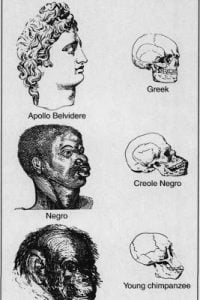Biological determinism, by definition, refers to the ”idea that all human behaviour is innate, determined by genes, brain size, or other biological attributes. Inherent to biological determinism is the denial of free will: individuals have no internal control over their behaviour and dispositions, and thus are devoid of responsibility for their actions”. It completely disregards the role of social and cultural environment in influencing behaviours and characteristics.
The concept of ‘essentialism’ delineates the idea that there are uniquely masculine and feminine personalities or characteristics, without any cultural or environmental influences. This idea was and is used to perpetuate and justify the concept of discriminatory constraints on women’s emotions, activities and participation in the ‘public sphere’.
Biological determinism, similarly, uses the idea of ‘inherent’ characteristics to account for male superiority and reflects the idea that men are naturally stronger, and rational and thus inherently smarter than women, and a person is born either as a male or a female only, with defined masculine and feminine characteristics. This separation lead to the demarcation between ‘public’ and ‘private’ spheres and since men were supposed to be ‘inherently good leaders’, only they could access the ‘public sphere’.
The origins of biological determinism can be traced back to Aristotle, who in ‘Politics’ remarked that distinctions between species is marked at birth, and ‘determines who are intended to rule and who are intended to be ruled’. After that, biological determinism has had a long history, which reached its zenith during the 19th century with the works of Samuel Morton and Joseph-Arthur de Gobineau.
It reflects the idea that men are naturally stronger, and rational and thus inherently smarter than women.
Although biological determinism as concept traces the characteristics of all of mankind, and is not specifically concerned with distinctions between male and female, it has been used as a tool to institute unequal gender relations and oppression of women. Similarly, racism is also based on biological determinism, as it propounded the notion that black people have a low intelligence and high tendency of criminality, justifying the discriminations against black people.

Scientific Racism. Image Source: ROWLAND WRITES AND DRAWS
One of the most typical examples of biological determinism is the view of Patrick Geddes and John Arthur Thompson, who in 1889, argued that the metabolic state of a person defines his/her physical, psychological and emotional state of being. These biological ‘facts’ were used to generate differences between men and women, as well as to justify these distinctions and prevalent social and political arrangements.
All in all, biological determinism refers to the idea that men and women’s respective social positions are encoded in and determined by our sexual differences. For example, biological determinism has been used to argue that women are genetically predisposed towards nurturing behaviour, whereas, men have an inclination towards adventure and violence.
Biological determinism not only perpetuates unequal division of sexes, but also justifies many sexist and toxic behavioural traits and attitudes. The phrase, ‘men will be men’ is one example of this. The phrase is associated with ‘masculine’ characteristics and are believed to be ‘natural’ and ‘inherent’ in men. The fact that men are naturally supposed to behave in a particular way, defined from their birth, rationalizes ‘toxic masculine characteristics’.
Biological determinism refers to the idea that men and women’s respective social positions are encoded in and determined by our sexual differences.
Proponents of this concept of ‘men will be men’ and that men cannot control their behaviour as it is inherently determined, even go to the extreme of saying that men are naturally prone to rape or criminal behaviours, thus perpetuating rape culture. Biological determinism holds that biology is the sole determinant of behaviour, ability, likes, and personality, and thus men ‘have no physical control over their actions’.
One insidious implication is the idea that men are biologically built to seek multiple sexual partners, and women, on the other hand, only want one sexual partner due to their specific biological structure, and thus, biological determinism dictates our sexual behaviours. This shows just cause for slut-shaming women who have intimate relations with more than one person, whereas men often receive approval for having multiple sexual partners.
Also Read: The History Of ‘Hysteria’ And How Science Can Be Sexist
Another common repercussion of biological determinism is the belief that while men are physically and intellectually superior, women are morally superior. This has often been used to give women a sense of power as morality enforcer which acts to support the larger system of male dominance. By placing women on a ‘morally higher ground’, women are pushed into a narrow ideology of morality, and how they are expected to behave according to it. On a larger scale, this enables the effective functioning of male superiority in the society.
Using the concept of morality to perpetuate oppression and violence against women is quite evident in the way the notion of ‘sanskar‘ works in India. Women are burdened with certain values and ethics, which influence the way they are supposed to behave. Any deviation from these moral ethics or values is seen as an offence and a community or family’s ‘honour’ is often tied to women’s ethical behaviour. This promotes subjugation of those women who do not confine to these values.
Also Read: We Need To Stop Viewing Women As The Flag-Bearers Of Nationalism
Most of it is not science at all – it is a conservative social rhetoric picking up those parts of science which will fit in and justify the existing and pre-determined practices and ideas. It is an ideology that uses science for marginalisation of a certain section of the population.
During the second wave of feminism, in order to dismantle the theory of biological determinism, feminist scholars found it useful to distinguish sex and gender. Sex came to be identified as the biological difference, whereas, gender was addressed as a social construct. It enabled them to argue that various differences between men and women are socially constructed and could be changed.
Gayle Rubin uses the phrase ‘sex-gender system’ and employed this system to describe that part of social life which forms the centre of women oppression, describing gender as the ‘socially imposed division of the sexes’.
Simone de Beauvoir, philosopher and feminist, applied essentialism to women’s experience of life and stated, ‘One is not born a women, one becomes one. Social discrimination produces in women moral and intellectual effects so profound that they appear to be caused by nature,’ thus challenging the notion that female characteristics are based on biology alone.
Gender differences results from cultural practices and social expectation. Feminine and masculine gender norms, subscribed by biological determinism, conveniently fit in with and reinforce women’s subordination so that women are socialized into subordinate social roles.
Male supremacy is not ‘natural’, but an unjust system of power and oppression, constructed for the sole purpose of exploitation. Similarly, women are not ‘naturally’ subordinate, they are socialized to be so. The various practices that are regarded as ‘feminine’ are not essential or determinative, and are definitely not based on genetics or biological structure.
women are not ‘naturally’ subordinate, they are socialized to be so.
In the past decades, scientific researches about hormones, genes and other human biological characteristics have disregarded the scientific basis of biological determinism, and largely accepted the idea that it is social and cultural environment that affects and influences human choices and behaviour. However, the idea that ‘men and women are born different’, and hence have different social roles, used to justify unequal gender relations, continue to exist in our society. Unless and until, this notion of biological determinism is not erased, the gender roles assigned to ‘public’ and ‘private’ spheres cannot be dismantled.
References:
Stanford Encyclopedia of Philosophy
Featured Image Credit: NJPAC.org
About the author(s)
Prerna is a history undergrad student who spends most of her time reading, dancing and arguing why everyone should be a feminist.





While it’s true that traditional male and female gender roles are not biologically determined but are learned, from the culture and society we live in, gender itself is. Gender is not biologically determined in the sense that people with vaginas are women and people with penises are men, but in the sense that it’s something innate to every person and that it cannot be known by looking at a person’s body or behaviour. Gender might be a social construct, but it’s a social construct of something real inherent to us. Saying gender is a social construct in the sense that gender doesn’t exist at all denies the humanity of binary and non-binary trans people and is a little trans exclusionary (like second wave feminist TERFs). Saying that implies that trans people are lying about their own experiences with their a/genders.
I’d say that gender is biologically (and maybe environmentally to some extent) determined, but also that it cannot be known by looking at someone’s body or the gender roles that they subscribe to. This means that a trans woman could be very masculine or a non-binary person could be very feminine. So gender can only be known by asking the person whose gender you want to know.
what a load of nonsense, the “innate” genders you mention is nothing more/less than femininity/masculinity (social consctructs made by the patriarchy so that males can feel justified in oppressing females), if you disagree with what i just said define what a woman or a man is without making use of gender stereotypes (you know the ones, like women like being all lady-like and men like being all macho-like)? and “it’s a ~feeling~” isn’t an argument